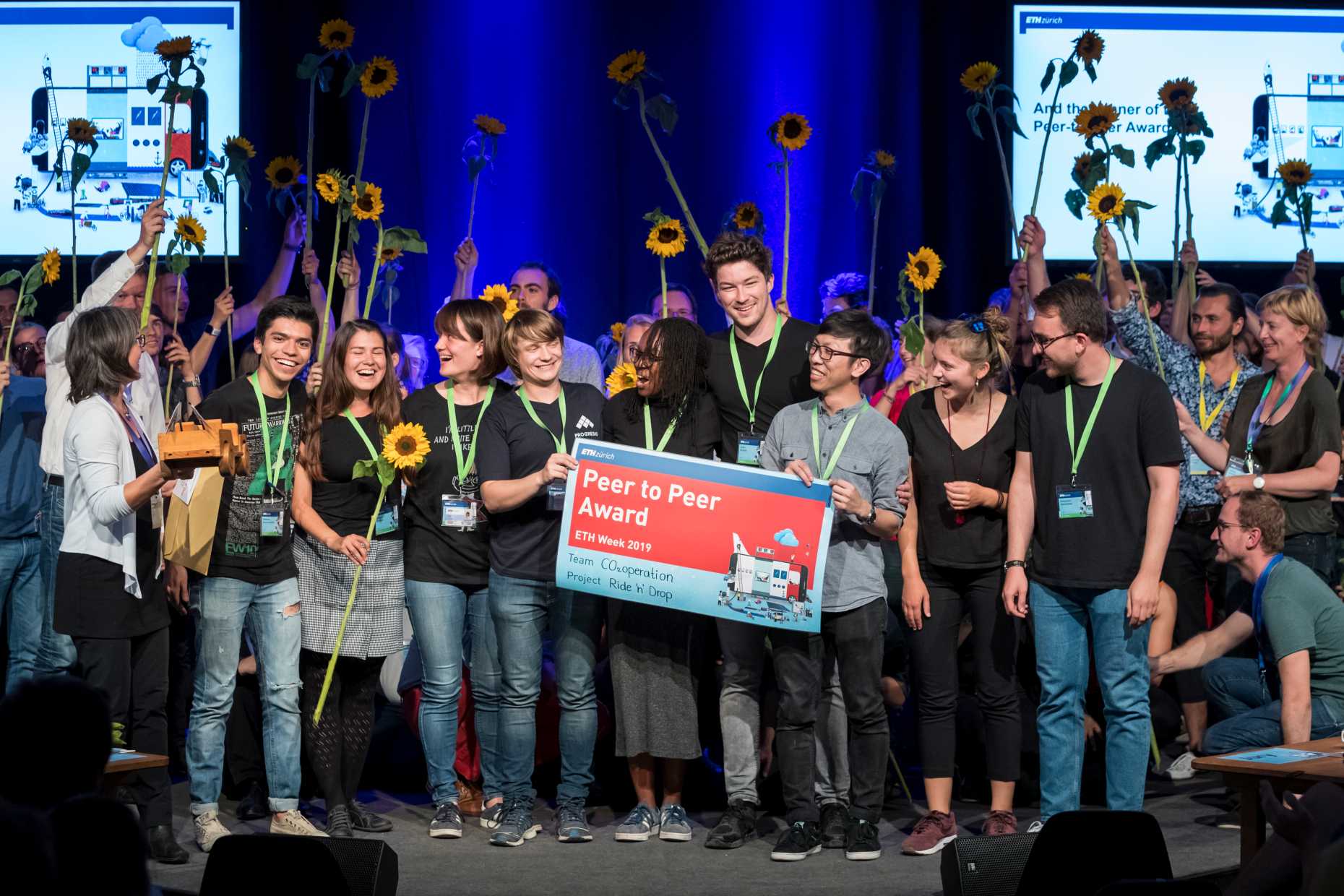Executive Board Update 2020 / 6
The Executive Board has given the green light to a large-scale project for improving accessibility throughout all areas of the university. Moreover, Manfred Sigrist has been named Vice Rector for Doctoral Studies, and the Board has taken the decision to hold ETH Week through at least 2025.

ETH Zurich is getting a new Vice Rector for Doctoral Studies. Manfred Sigrist, a professor of theoretical condensed matter physics, will take over the reins from Antonio Togni, who is set to retire and step down from his post on 31 January 2021. Sigrist has been elected to serve from 1 February 2021 to 31 December 2022, which is the same term to be served out by the Vice Rector for Study Programmes, the Vice Rector for Curriculum Development and the Vice Rector for Continuing Education. The Executive Board would like to extend great thanks to Antonio Togni for his valuable service during this challenging time. During his tenure, he was instrumental in bringing about significant improvements to doctoral studies at ETH. The Vice Rector for Doctoral Studies is responsible for central procedures such as admission to doctoral studies and the issuing of doctoral degrees. They ensure the quality of doctoral programmes in conjunction with the academic departments, who bear responsibility for their content.
ETH to continue its Bachelor of Human Medicine
ETH launched its Bachelor’s degree programme in Human Medicine as a pilot project in 2017. Due to its success, it will now be permanently introduced as a regular ETH undergraduate degree programme. Lecturers and students alike have had a thoroughly positive experience (see the ETH News article from 28 September 2020). ETH Zurich will continue to take in 100 Bachelor’s students per year, and they will go on to complete their Master’s degree studies at one of three partner universities in Lugano, Basel or Zurich. The annual costs for the programme amount to around CHF 5 million. The HEST department holds chief responsibility for the degree programme and receives support from the BIOL, CHAB, INFK, ITET, MATH and PHYS departments. ETH Zurich is also expanding its continuing education programme to offer a MAS in Digital Clinical Research. The MAS will offer new clinical research insights to doctors beginning in the Autumn Semester of 2022.
Breaking down barriers
ETH Zurich wants to offer everyone access to its buildings and services, regardless of any impairments they may have. The Barrier-Free at ETH Zurich project aims to make this a reality. Over the course of the next few years, people with physical limitations or special needs – be it students, lecturers, researchers, employees or visitors – should benefit from greatly improved accessibility at ETH Zurich.
“Society rightfully expects institutions like ETH Zurich to be inclusive and to eliminate barriers to accessibility. This project will help us become a mostly barrier-free university over the course of the next few years.” Ulrich Weidmann, Vice President for Infrastructure
The Executive Board has signed off on the project’s sweeping master plan, which contains 15 sets of measures: nine for structural improvements, four for technological improvements and two for organisational improvements. These measures include adapting existing buildings to make them more accessible, creating accessible course materials, and drafting and publicising a mission statement on openness and inclusion. Structural improvements will be made over the course of the next 15 or so years. Other improvements – such as accessible signage and a powerful indoor navigation system – will be introduced sooner. According to current estimates, the entire project will cost between CHF 85 and 90 million. There will also be additional costs for several existing buildings that have not yet been assessed. The Executive Board will approve the sets of measures on a staggered basis in line with the university’s financial situation.
Extension of ETH Week
ETH Week will continue to be held through at least 2025. Since its first edition in 2015, ETH Week has brought together around 200 students from all academic departments to tackle a particular topic in-depth during the final week before the start of the Autumn Semester. Hailing from 50 countries, the students work in interdisciplinary teams to find solutions, holding discussions with professors and representatives from the private sector, NGOs and public administration. The Executive Board has approved ETH Week’s annual budget of CHF 360,000 through the year 2025. In 2024, both ETH Week and its follow-up programme The Hatchery will be evaluated and reviewed for another possible extension. ETH Week is ETH’s flagship teaching project. It offers a framework for developing new forms of teaching and making them available to the public. ETH Week recently made it onto the shortlist of the Wharton-QS Reimagine Education Award in the sustainability category.

Status of equal opportunities at ETH Zurich
ETH Zurich has published the eleventh edition of its Gender Monitoring report. Starting this year, the report will now go by the name Equality Monitoring in order to reflect the inclusion of additional aspects of diversity. In 2019, the percentage of female students rose slightly from 32 percent to 32.3 percent. The percentage of women holding professorships posted a higher increase, jumping from 14.9 percent in 2018 to 16.3 percent in 2019. When considering only full and associate professorships, there was a one percent increase from 13.3 percent to 14.3 percent. Last year, women made up around half of new appointments to assistant professorships and 21 percent of new professorship appointments overall. The focus of this year’s report is on the diversity of the ETH community. The Executive Board views diversity as a source of enrichment for our university. Topics such as ethnic origin, religion, social mobility and sexual orientation will continue to grow in importance at ETH – despite the current lack of data on these characteristics. You can find out more in this detailed article.
New ETH representative at the kihz Foundation
Julia Dannath-Schuh has been appointed to serve as a member of the external pagekihz Foundationcall_made starting on 1 January 2021. Dannath-Schuh, the new Vice President for Personnel Development and Leadership, will take over the post of Vice-Chairwoman from Rector Sarah Springman, who will step down when her term concludes on 31 December 2020. Dannath-Schuh will join D-MTEC professor Volker Hoffmann and HR chief Lukas Vonesch as representatives of ETH Zurich on the kihz Board of Trustees. The Executive Board has approved the latter two members for an additional term in office. The vacant seat of the emeritus Renate Schubert will be filled at a later date. The kihz Foundation is a joint organisation run by the University of Zurich and ETH Zurich that provides childcare services to the university community in the Zurich area.
Development of academic IT applications
Every year, academic applications at ETH process 5,000 courses, 159,000 performance assessments and 5,200 final degrees. This IT system forms the backbone of all administrative processes related to teaching at ETH, handling everything from student applications to academic transcripts. The system traces its origins back to 1998 and has been expanded and updated on an ongoing basis since then. After over two decades in operation, the system has reached the end of its life cycle and requires a complete overhaul. The Executive Board has approved the WELBA 2021-2022 project, which foresees important new upgrades over the next two years as well as the creation of a modern IT architecture concept for academic applications. To this end, the Academic Services, IT Services and Educational Development and Technology departments have been granted a total project budget of around CHF 3.8 million.
Review of student data regulations
Anyone who studies at or applies to ETH Zurich has to provide personal information to the university, and this sensitive body of data grows over the course of one’s studies. In compliance with Article 36b of the ETH Act, the university will now create regulations that stipulate how this data shall be processed. The Executive Board has taken note of a draft version of the document (“Regulations on processing the data of university applicants and students”), which is mostly based on current practices. The regulations have been sent around to academic departments and university groups for a review process lasting until late May 2021. The regulations do not yet include provisions on the use of cloud systems. This issue will be incorporated into the regulations once the Swiss parliament sets out the relevant guidelines in its ongoing revision of the ETH Act.
Improved login security
Logging in to central IT systems and applications at ETH needs to be made more secure. The Executive Board has taken a step in this direction with the decision to implement multi-factor authentication. This means that in order to log in, users will need both a password and a second form of authentication such as an SMS code or an app. The idea is to combine multi-factor authentication with a single sign-on solution so that members of ETH community only have to log on to the central IT system once per day. The Vice President for Infrastructure has been tasked with drafting a security concept that takes important user groups into consideration. The concept should be presented to the Executive Board for a decision by the middle of next year.
An Internet of Things for ETH
More and more devices feature internet connectivity. With the Internet of Things (IoT) growing in importance, the Executive Board has decided to create a central IoT service for the university. The aim is to integrate the Internet of Things into the ETH infrastructure in a cost-efficient and secure way. The IoT service will be offered free of charge to all members of the ETH community. The Executive Board has also set aside the necessary resources for this project and tasked the Vice President for Infrastructure with drafting mandatory regulations for securely integrating the new IoT service into the ETH system.
Regular updates from the Executive Board
The ETH Zurich Executive Board holds scheduled meetings every two weeks and provides feedback in the form of regular updates. This issue reports on the key decisions taken at the meetings held in September and mid-October (1 September, 15 September, 29 September and 13 October).
